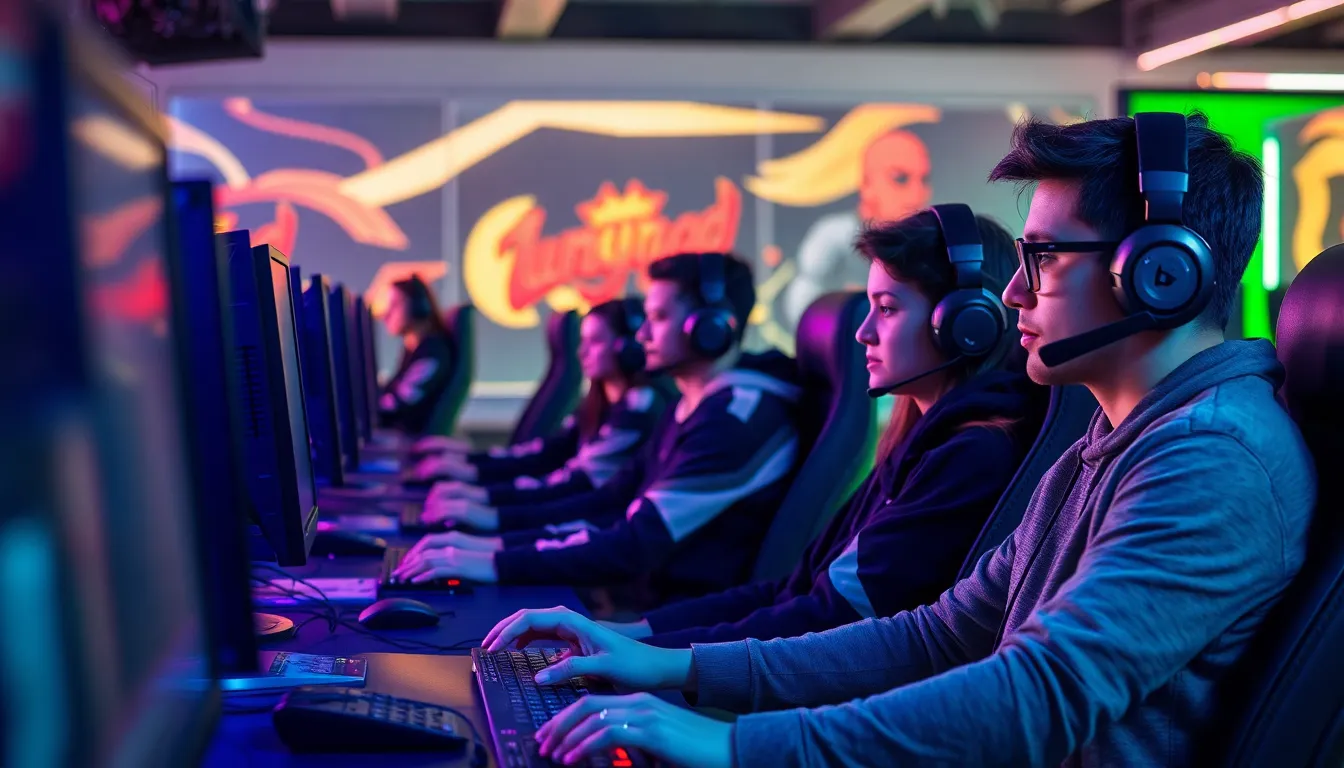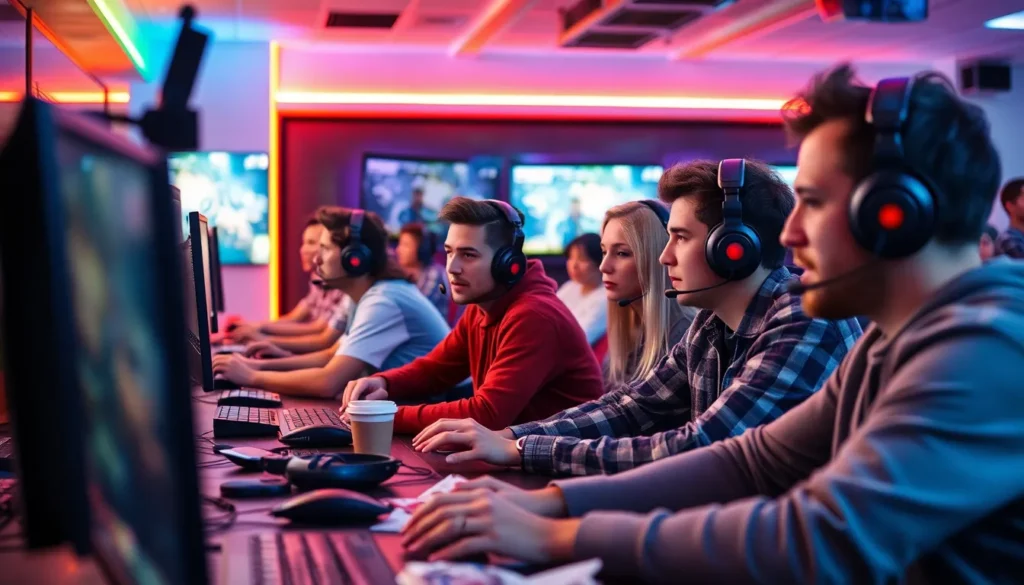Table of Contents
ToggleIn the ever-evolving world of online gaming, leagues have become the ultimate battleground for players who crave competition and camaraderie. Forget about the days of solo grinding; now, it’s all about teamwork, strategy, and maybe a little trash talk. Whether you’re a seasoned pro or a casual gamer, joining a league can elevate your gaming experience from “meh” to “wow, did you see that play?”
Overview of Online Gaming Leagues
Online gaming leagues provide players with structured competition and an opportunity to connect with others who share similar interests. Different leagues cater to various skill levels, enabling both casual and competitive gamers to participate. Gaming communities often thrive in these leagues, creating friendships and fostering teamwork.
Players engage in regular matches organized by specific rules and formats. Participation in these leagues leads to improved skills due to consistent practice and interaction with diverse teams. Competitive environments motivate gamers to enhance their strategies and tactics, while support from teammates encourages growth.
Numerous titles host online gaming leagues. Popular games like “League of Legends,” “Overwatch,” and “Counter-Strike: Global Offensive” boast well-established league systems. Valuable resources exist for players interested in joining, including league websites and platforms that provide information on registration, rules, and schedules.
Statistics indicate that the online gaming league landscape has expanded significantly. Approximately 40% of gamers actively participate in organized competitions, reflecting increased interest in structured play. As leagues evolve, technological advancements continue to enhance player experience with features such as live streaming, match analytics, and community engagement tools.
Engagement in online gaming leagues fosters a sense of belonging and loyalty among participants. Players often seek leagues not just for competition but also for the camaraderie built through shared experiences. With an ongoing emphasis on teamwork and strategy, online gaming leagues serve as pivotal components in the modern gaming ecosystem.
Types of Online Gaming Leagues

Online gaming leagues come in various formats, catering to different player interests and skill levels. Understanding these types helps gamers choose the right league for their competitive aspirations.
Professional Leagues
Professional leagues feature high-stakes competitions where players often earn money and sponsorships. Popular titles like “League of Legends” and “Overwatch” host these leagues, drawing skilled players and significant audiences. Rigorous training and strategic gameplay dominate these environments. Teams typically compete in structured tournaments, showcasing exceptional skills and teamwork. Regular matches and live broadcasts enhance viewer engagement, leading to a vibrant community around professional gaming.
Amateur Leagues
Amateur leagues offer a more casual and inclusive atmosphere, welcoming players of all skill levels. Gamers can join these leagues to practice their skills and connect with others. Platforms often provide resources for team formation, match organization, and player development. Casual competition encourages social interaction and creates opportunities for friends to collaborate. Participation in amateur leagues allows players to gain experience and confidence before potentially moving into more competitive realms.
Popular Games in Online Gaming Leagues
Online gaming leagues encompass a variety of popular titles that attract gamers worldwide. These games enhance competition and foster community among players.
Esports Titles
Esports titles dominate the online gaming league landscape. Games like “League of Legends,” “Dota 2,” and “Valorant” have well-established league systems. Professional players compete for significant prize pools, with tournaments drawing large audiences. “Counter-Strike: Global Offensive” consistently ranks among the top choices for competitive gameplay. These games emphasize teamwork, strategy, and skill, making them appealing for serious gamers. High-profile matches often receive extensive coverage, keeping fans engaged and informed about their favorite teams and players.
Casual Games
Casual games provide an accessible entry point for gamers interested in leagues. Titles like “Fortnite,” “Rocket League,” and “Among Us” offer competitive formats without the pressure found in professional leagues. These games foster inclusive environments, encouraging participation from all skill levels. Players enjoy regular tournaments and events designed for fun and social interaction. The emphasis remains on enjoyment rather than solely on competition. Many gamers find value in joining casual leagues to practice skills and develop friendships.
Benefits of Participating in Online Gaming Leagues
Online gaming leagues offer various advantages for participants, enriching both gaming skills and social connections.
Skill Development
Continuous practice in leagues enhances player skills. Regular competition pushes individuals to refine strategies and optimize gameplay. Exposure to diverse team dynamics helps gamers learn new tactics. As players face opponents of varying skill levels, adaptability becomes crucial. Consistency in matches fosters improvement over time. Ultimately, participating leads to better coordination, communication, and game understanding.
Community Engagement
Online gaming leagues promote strong community ties. Gamers often find friendships that extend beyond the screen, creating a sense of belonging. Collaborating with teammates allows for shared experiences during matches. Interaction fosters collaboration and teamwork, essential for success in competitive scenarios. Involvement in organized events strengthens connections among players. Regular tournaments provide opportunities for social engagement and networking within the gaming community.
Challenges Faced in Online Gaming Leagues
Online gaming leagues encounter several challenges affecting player experiences and competition integrity. Addressing these issues is crucial for maintaining a vibrant gaming environment.
Cheating and Fair Play
Cheating presents a significant obstacle in online gaming leagues. Players using hacks or exploits disrupt fair competition, undermining the spirit of the game. Ensuring fair play is essential for maintaining trust among participants. Game developers often implement anti-cheat systems to deter dishonest practices, but determined cheaters continually find ways to bypass these measures. Counteracting cheating involves regular updates and community reporting mechanisms that help maintain a level playing field.
Technical Issues
Technical issues can hinder the performance and enjoyment of online gaming leagues. Network lag affects gameplay quality, making it difficult for players to compete effectively. Server downtime can disrupt scheduled matches, frustrating participants and fans alike. Additionally, connectivity problems can lead to disconnections during critical moments in a match. Game organizers often invest in robust infrastructure and support teams to address these challenges proactively. Overall, resolving technical difficulties is vital for ensuring a seamless gaming experience and supporting long-term player engagement.
Online gaming leagues have revolutionized the way players engage with their favorite titles. By fostering teamwork and community, they create an environment where gamers can thrive both competitively and socially. The structured competition offered by these leagues not only enhances skills but also builds lasting friendships among participants.
As the landscape continues to evolve, leagues cater to a diverse range of players, from casual enthusiasts to aspiring professionals. While challenges like cheating and technical issues persist, ongoing efforts from game developers and organizers aim to ensure fair play and a seamless experience. Ultimately, online gaming leagues stand as a testament to the vibrant and interconnected world of gaming, making participation a rewarding endeavor for all.




